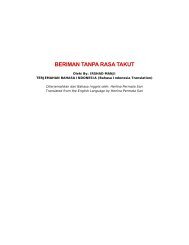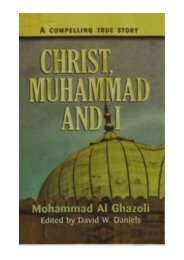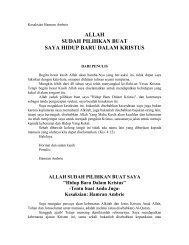A Critical Analysis of 'Real Islam'. Its People ... - Bukti dan Saksi
A Critical Analysis of 'Real Islam'. Its People ... - Bukti dan Saksi
A Critical Analysis of 'Real Islam'. Its People ... - Bukti dan Saksi
Create successful ePaper yourself
Turn your PDF publications into a flip-book with our unique Google optimized e-Paper software.
and understood that murder was allowed for Islam. There is nothing to refute that they had been<br />
murdering people all along, and Thabit rightly knew the she would be on Muhammad's hit list quite<br />
shortly. And, true to form, Muhammad dispatched his followers to kill her.<br />
Now, at first glance, this order to kill Asma might seem justifiable to some. Asma was calling for<br />
someone to do away with Muhammad. But then, after all, he had been murdering her friends. But from<br />
Muhammad's viewpoint it is understandable that he might be troubled by her call. It is obvious that<br />
peaceful folks who are no threat to their neighbors normally have no reason to fear, but Muhammad's<br />
followers were practicing a hard-ball form <strong>of</strong> religion with no room for dissent or opposition. Today gang<br />
leaders, organized mobsters, drug cartels, and other criminal elements are similarly upset by those that<br />
expose and speak out against their murderous activities.<br />
So let's look deeper at the event and examine the context <strong>of</strong> Asma's views, relationship to her tribe,<br />
and the threat she posed to Muhammad;<br />
1. First, Asma had seen Muhammad in action. She had personal knowledge <strong>of</strong> several apparent coldblooded<br />
murders. Of course, it seems reasonable by western standards that she should speak out against<br />
them.<br />
2. Second, her tribe was not under Muhammad's rule. Perhaps they had a treaty with Muhammad,<br />
perhaps not. Either way, this woman was apparently free by local laws and norms to speak her mind. If a<br />
treaty existed, and she was out <strong>of</strong> line, Muhammad could have complained to her tribe's leaders, and they<br />
could have commanded her to be silent or dealt with the situation.<br />
3. What's more noteworthy about this event is that after she was murdered, Muhammad said; "Two<br />
goats won't butt their head about her", meaning no one will care about her death. Obviously at a minimum<br />
her children, her family, and her friends felt differently, but that did not register as important to<br />
Muhammad any more than the value <strong>of</strong> her life as an unbeliever. Also note, that there were already people<br />
from her tribe who had become Muslims. Certainly these people were not going to listen to her.<br />
The summary <strong>of</strong> these three points is this: if no one <strong>of</strong> significance really cared about her being<br />
murdered, then no one really cared about what she had to say. Her people also knew about Muhammad<br />
having Abu Afak murdered, and they didn't care about that either. In that light, it seems unlikely anyone<br />
would take her seriously enough to respond to her urgings to murder Muhammad, who was the leader <strong>of</strong> a<br />
powerful group <strong>of</strong> people. None <strong>of</strong> her own people were willing to put their lives on the line for her<br />
words. Although her stand seemed justified and principled, it had insufficient local support, which<br />
Muhammad perceived.<br />
The bottom line is that Asma b. Marwan was not a legitimate threat to Muhammad. She was not a<br />
leader <strong>of</strong> her tribe and had little or no influence. As such she was neither a physical threat nor wielded<br />
power to command followers. She was little more than a nuisance, yet Muhammad had her murdered in<br />
premeditated cold blood anyway. It appears that both Asma and Abu Afak were killed simply because<br />
they rejected Muhammad, and their deaths chronicled to serve as examples in order to dissuade other<br />
would be critics. In our day, how would a society based on law and individual rights react to an organized<br />
group who murder sleeping civilians for the reasons and purposes just outlined, and what would happen<br />
to the leadership <strong>of</strong> that group?<br />
INCIDENT # 3 – Muhammad’s Attack upon the Jews <strong>of</strong> Banu Qaynuqa<br />
Shortly after Muhammad arrived in Medina he had conflict with the Jews. There were a number <strong>of</strong><br />
large and small tribes <strong>of</strong> Jews in and around Medina. The Banu Qaynuqa Jews were one <strong>of</strong> the larger<br />
tribes. Muhammad desperately wanted the Jews to believe in him, but almost to the man they refused. The<br />
more learned Jews perceived immediately that Muhammad’s claim <strong>of</strong> being a prophet did not jibe with<br />
their traditions and earlier teachings <strong>of</strong> the prophets, and they quickly rejected him. Their rejection<br />
undermined Muhammad's credibility because they had the "Scriptures" (i.e. Torah or Old Testament).<br />
Thus, they were a threat to Muhammad and the theology he was in the process <strong>of</strong> establishing. From early<br />
on there were very ill feelings between the Jews and Muhammad. As Muhammad's power grew he began<br />
to confront the Jews.





